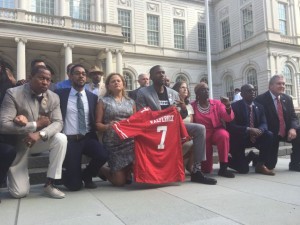The actions of many of our elected officials have become juvenile expressions of outrage. In 2016, several House Democrats staged a sit-in on the floor of Congress, after losing a legislative battle. Rather than retool their message and try again, they engaged in a collective temper tantrum.

The New York City Council Takes A Knee prior to the September 26 Stated Meeting. Credit: Madina Toure/Observer
America’s national conversation has gone astray. Abandoning rational standards of discourse, evidence and facts, inflammatory statements go unchallenged by legislators and pundits intimidated by a media hierarchy that discourages journalistic standards because those plutocrats of information have become participants in, rather than reporters of, public affairs.
Perhaps no issue more openly illustrates this point than the NFL “take a knee” controversy. While an extraordinary level of attention has been paid to those engaging in the practice, little attention has been paid to questioning whether the underlying premise of the rather sophomoric gesture is accurate. If the purpose of the action was to focus attention on the question of racism, the move has been a failure. The discussion has been all about the theatrics.
Mathew Walther writes that “Outrage has become our national pastime. The only thing that could possibly make American political discourse…dumber would be if someone … decided to insist that President Trump’s comments about pro football were…actual grounds for his impeachment…Rep. Al Green (D-Texas) stood on the floor of the House of Representatives and announced that… he intends to ‘call for the impeachment of the president…Green does not, of course, actually believe this … And that’s the problem. None of our conversations actually have anything to do with the things they are ostensibly about.”
Legislators are well schooled by professional handlers in the theatrics of electoral politics, but remain far less educated in the issues they must decide on once in office. While the collection of organizations and individuals who specialize in training candidates on how to run for office share the blame, the principal responsibility rests with the media. After all, it’s all about good publicity and how to get it, and that commodity rests solely in the hands of the media. Consider a debate between two candidates: Candidate A displays true passion and just oozes with emotion about a particular issue. Candidate B coldly discusses the hard facts of the matter, based on hard and intense research, and offers a viable solution that may involve some discomfort but will solve the problem. Guess who wins the contest? Without a doubt, candidate A. A will be portrayed as sympathetic and caring by the press, despite not offering any realistic resolution. B will be cast as an unfeeling individual unworthy of support, despite the fact that B actually stands a chance of ending the dilemma.
America’s faulty education system, along with our touchy-feely culture, shares a good portion of the blame. The hard-driving, sometimes rough-edged heroes of prior generations who explored a new world, drove out an overbearing monarch, settled the West, fought to end slavery, built the world’s most dynamic economy and beat enemies in two world wars are no longer in vogue. Both academics and Hollywood types work overtime to find personal faults with those who actually accomplished something. In their eyes, it would have been better if those champions had stayed home and spent their days getting in touch with their feelings.
Frank Vernuccio serves as editor in chief of the New York Analysis of Policy and Government.

















Follow Us